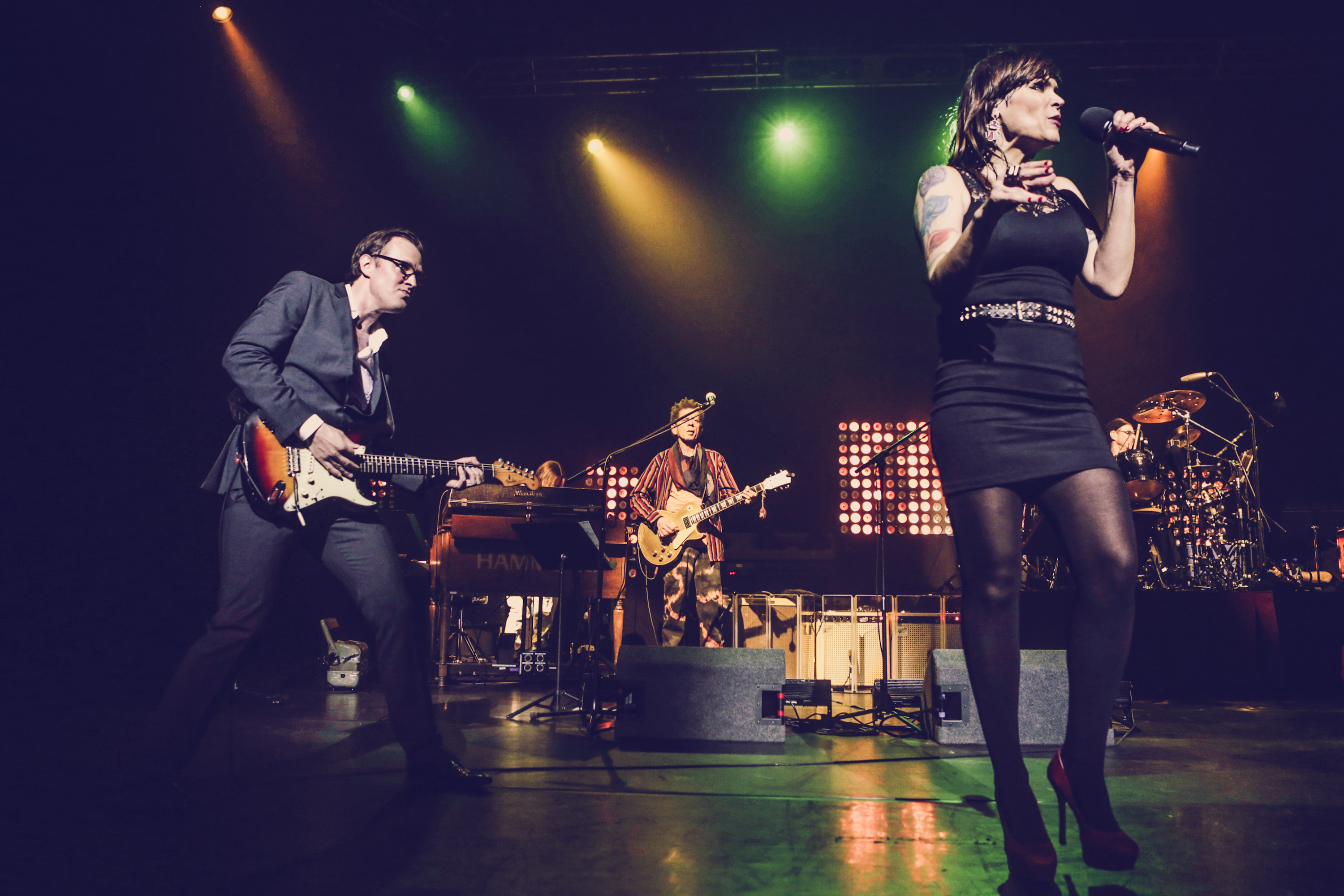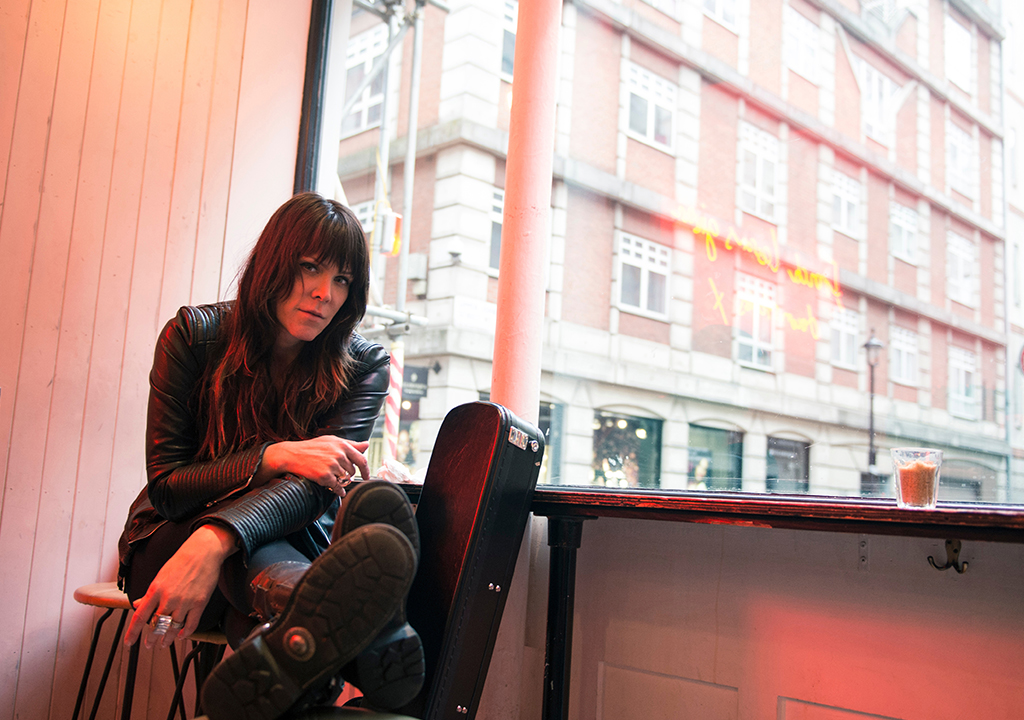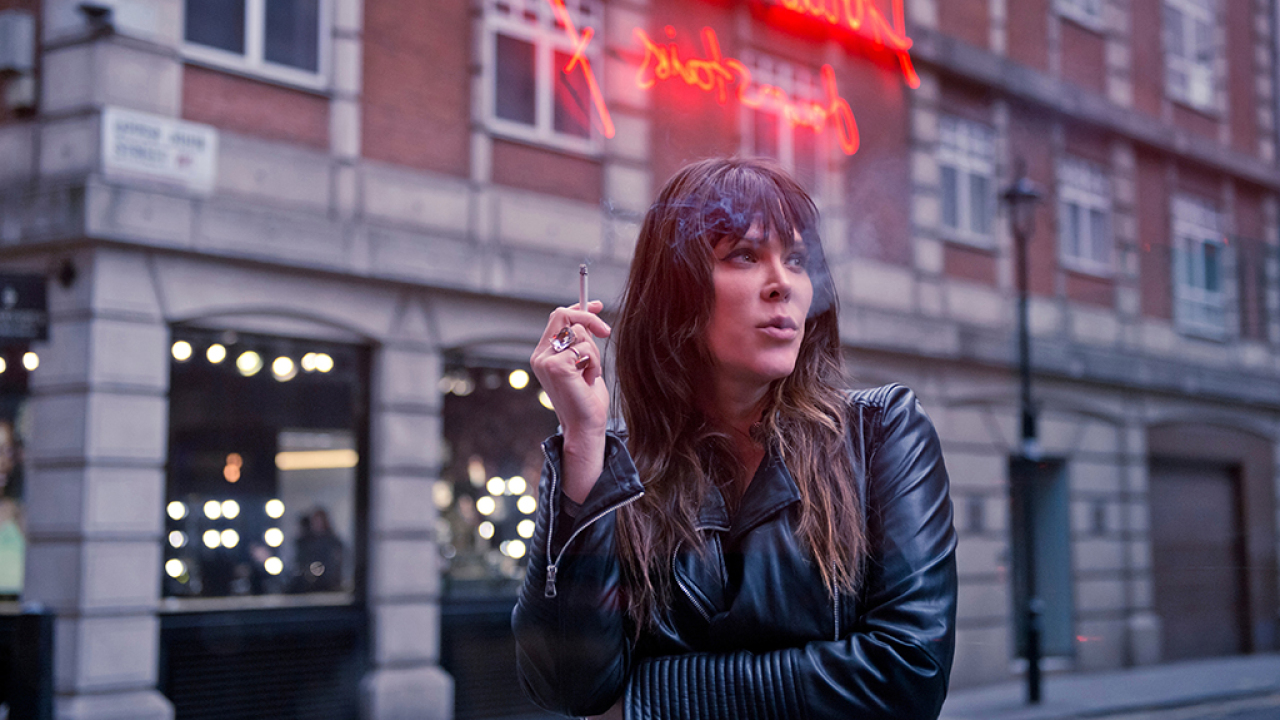In December 2012, Beth Hart was granted an audience with President Obama. The scene was the annual Kennedy Center Honors, held at the upscale Kennedy Center Opera House in Washington, DC, and Hart was there to perform Etta James’s I’d Rather Go Blind with Jeff Beck as part of a tribute to venerable bluesman Buddy Guy.
In fairness, Obama was only watching from the audience. But as far as audiences go, it was a stellar one. As well as the most important man in the Western world, the 2000-strong suited-and-booted crowd featured such VIPs as Robert Plant and Jimmy Page, comedian Tina Fey and chatshow host David Letterman. Equally heartbreaking and life-affirming, I’d Rather Go Blind was a fitting choice for Hart. Pouring her heart out in front of this A-list audience, she brought the song to an emotional climax and received a standing ovation for her efforts.
Watch the YouTube clip now and you’d be forgiven for thinking that Hart’s journey to this elevated position had been smooth. Certainly, her CV would suggest as much: as well as her on-stage hook-up with Jeff Beck, she has been involved in two acclaimed collaborations with Joe Bonamassa to go alongside eight of her own solo albums.
But just like the great blues singers who inspired her, Hart’s 43 years have been peppered with turmoil. A voice that smoulders with soul and passion masks – or possibly reflects – a life beset by troubles that started when she was young and carried on through the early part of her career.
Hart was born in 1972 in Altadena, a poor suburb of Los Angeles, and raised in a turbulent home environment. The traumas piled up early on: her parents split up when she was a child, her father was jailed for an unspecified crime, and her sister contracted AIDS, a disease that eventually killed her. The latter had a huge impact on the young Beth. Wracked with guilt at having survived, she sought numbness in pot and alcohol. In her own words, she was “nuts and struggling”.
“I grew up in a bail-bond family,” she reflects now, sitting in a well-upholstered London hotel that’s a world away from the place she grew up, and sporting an expensive-looking leather jacket. “The first time I ended up in jail as an adult – it was just for one night – my folks refused to bail me out and it made me wonder what I was going to do with my life.”
Expelled from high school at 15, Hart ran away across America, eventually ending up in Brooklyn. It was there, in 1993, where she won TV talent show Star Search, triumphing over an unknown 12-year-old singer named Beyoncé Knowles. The $125,000 prize money posed a dangerous risk for somebody with such an addictive personality as hers. “I spent every last dime in less than six months,” she says.
Back on the poverty line, Hart began busking, fully expecting to be doing so for the rest of her life. Instead, she was spotted by Atlantic Records, who teamed her with a unit of high profile producers that included ex-GN’R associate Mike Clink for a debut album, Immortal. Credited to Beth Hart And The Ocean Of Souls, it promptly sank without trace. Six years later, the label gave her another chance with Screamin’ For My Supper. “That one did better,” she says.
By then, Hart’s drinking had spiralled so far out of control that she was struck by seizures. To combat them, she was prescribed Klonopin, a drug that she calls “way better than any other I’d tried”. Lost in a haze of drink and drugs, she was only barely aware that she’d blown her second and seemingly final chance. Atlantic dropped her with the words: “We won’t sit back and watch you die.”
A turning point came in 2000, when she was diagnosed as bi-polar. “I was so dangerous to myself and others that I believed I was a bad seed,” she says with a sigh. “That was until the doctors told me I wasn’t a bad person, I was very sick. If I took the medicine and was willing to endure the therapy it would never go away, but it could be manageable.”
The first time I saw Beth Hart on stage was in 2008 at a minuscule, and now defunct, London venue called The Fly. Statuesque, covered in tattoos and cursing like a docker, she exuded charisma. She covered Led Zeppelin’s Whole Lotta Love and Soul Shine by Gov’t Mule, and sang of self-mutilation and that turbulent family background on the autobiographical Leave The Light On (‘Seventeen and I’m all messed up inside/I cut myself just to feel alive’). But for all of her on-stage presence, Hart was in a precarious place that night, informing the crowd that just two-and-a-half months earlier she had relapsed after more than half a decade of continuous sobriety. “I’d suffered a mental breakdown,” she now recalls. “Coming out of hospital I took drugs, which really helped.”
Seven years on from that gig, Hart is in a very different place. For one thing, she’s jettisoned the 12-Step programme in favour of regular visits to church. “I have an amazing pastor,” she says. “I follow everything she tells me, and the desire to drink is gone. Of course I don’t know whether it will last, but I can tell you that each day feels like a miracle.”
Hart is also happily married to Scott Guetzkow, her enormously patient and understanding road manager. “Yesterday was our fourteenth anniversary, and on a daily basis I wonder how on earth he puts up with me,” she says.
In a very real sense, Guetzkow has helped to keep Hart alive. As she relates the tale of how he once protected her during a seizure, she begins to cry.
“I was praying that I would die and Scott laid his body on top of mine to restrain me,” she says between sobs. “We were both crying. I hadn’t felt a love like that since my mother when I was very little. I knew that God loved me, and it was okay to come back to life.”
Guetzkow is the subject of at least one song, Mechanical Heart, on her eighth album, Better Than Home. It’s not the first time she’s tackled real-life narratives, most notably Sister Heroine from 2010’s My California, a song born of the grief that came from losing her sister to Aids. Few artists would reveal as much about themselves, but Hart draws no line between personal experience and her music: “Laying my life so bare isn’t always a good thing, especially for my family, but I’ve always been a very open person. So get used to it. This is part of what I do.”

Hart’s career path has seen her largely lumped in with the blues crowd, but she’s proved far more versatile than that. Across her eight albums, she’s dived deep into earthy rock’n’roll, fulsome jazz, sensitive balladry and even slinky singer-songwriter fare. And then there are the soul covers she recorded with Bonamassa across the two albums they made together, 2011’s Don’t Explain and 2013’s Seesaw. Their collaboration is a world away from most of her solo work, but it’s one that has raised her profile. Their collaborations have also helped Hart focus on her own worth ethic.
“Oh yeah, Joe’s so driven,” she says with a laugh. “But he also made me understand that the more you work at something, the stronger you will become. He made me change my focus away from recording to touring. You’ve gotta hit the pavement.”
Hart believes that Bonamassa – a team-up she suggests could stretch to a third album in 2016 – shares something with both Jeff Beck and Slash, another occasional collaborator. “All three of those guys let me be myself, in a musical sense and also in the way that they treat every person in the room,” she reveals. “I found that fascinating and also very smart. You bring the best out of people by not telling them what to do.”
Her appearance at the Kennedy Center Honors with Beck was one of the high-points of Hart’s career, but the singer’s most intimidating moment came not through meeting President Obama or his wife, Michelle, but instead finding herself a few feet away from Aretha Franklin at an official reception.
“I immediately crossed the room and stood with my face to the wall,” she recalls, looking horrified. “I couldn’t handle being close to such a hero. Had it been Etta James, I’d have left the White House and flown to China.”

Franklin is one of Hart’s obvious vocal heroes. Another, altogether more unlikely one is Ozzy Osbourne. “I will never forget the first time I heard him singing [Black Sabbath’s] Changes,” she says. “It made me cry.” But one name she noticeably omits from her list of influences is the singer she’s most compared to: Janis Joplin. Is Hart purposely leaving her out?
“No!” she fires back. “Being compared to her is an absolute fucking honour. I don’t seek to be original. I just want to communicate, and I crave the feedback to let me know I’m not crazy.”
There’s no escaping the fact that many of the singers that Hart looks up have had their own struggles with drugs and alcohol. And like Ozzy before her, the struggle to stay on top of her demons is a hard one.
“Happily, for the last 15 years I’ve been drug-free,” she says. “Binge drinking still happens though. It’s something I did since the age of 35. I’ll go six or nine months, and despite my best intentions, I’ll slip. Or at least I did.”
The opening track on Better Than Home is called Might As Well Smile. On it, she sings: ‘I woke up this morning with a smile on my face/I threw out those stones that stood in my way.’ Like I’d Rather Go Blind, it’s a song of defiance; a survivor’s hymn.
“I used to be. But there’s a difference between surviving and living,” she ponders. “Now I’ve gotten past my demons, which makes me feel blessed and grateful. That’s where my writing comes from these days. I’ve been given this gift of how to live with addiction and being bi-polar.”
THE BEST OF BETH
Half a dozen Hart songs you should hear
**LA Song **
In a cute self-fulfilling prophecy, LA Song – from 1999’s Out Of This Town - was the slice of endearing whimsy that rescued Hart’s career from oblivion, taking her from California and placing her on the world stage.
Leave The Light On
As her confessional side developed Hart’s creativity really exploded into life. The brittle, beautiful title track of her third album is among the very best things that she’s ever done.
As Good As It Gets
Topped off by a powerhouse vocal delivery, this strident, buoyant rock song proves that, for all her woes, Hart also does a mean ‘glass half full’.
Mother Maria
A sensitive ballad performed at the piano by Hart and penned with former Guns N’ Roses guitarist Slash for his debut solo album. The ideal showcase for her vibrato.
I’d Rather Go Blind
Hart and Joe Bonamassa’s rendition of the Etta James-popularised blues standard. Quite rightly, it became a show stopper during the pair’s live concerts.
Might As Well Smile
As heard on the new album, Better Than Home, Might As Well Smile reflects Hart’s revised and improved mindset. She’s glad to be alive, and it shows.

